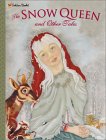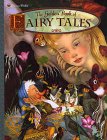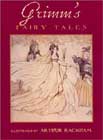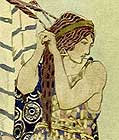
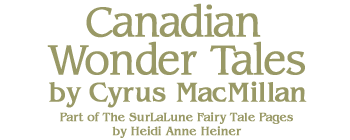
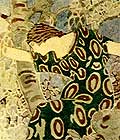
Canadian
Wonder Tales
by Cyrus MacMillan
The
Boy and the Robbers' Magical Booty
The
Coming of the Corn
The
Boy of Great Strength and the Giants
The
Strange Tale of Caribou and Moose
The
Sad Tale of Woodpecker and Bluejay
The Coming of the Corn
IN old times there dwelt on the shores of a great lake a mighty warrior. His people had all been driven far away inland by hostile tribes, but he remained behind to roam over the islands in the Lake and to send his people word of any approaching attack. His wife was dead; she had been killed by treacherous foes. He had two little boys, and he kept them with him in his wanderings by the Lake. He was a great magician as well as a man of great strength, and he had no fear in his heart. The islands in the Lake were haunted by spirits or "manitous," but the man was not afraid of them, and with his boys he paddled his canoe up and down, watching for signs of his foes. Each night he landed in a cove, and pulled his canoe far up among the trees, and slept in the woods out of the sight of travellers. But he found it very hard to get game and fish, and often his boys were very hungry.
One morning at dawn of day he rose and went to find food for breakfast. He left his little boys asleep under the trees. He walked through the forest until he came suddenly upon a wide and open red plain. There was not a tree or a rock or a blade of grass upon it. He set out across the plain, and when he reached the middle of it, he met a small man with a red feather in his cap. "Where are you going?" said the little man. "I am going across the plain to the woods on the other side," said the man; "my boys are hungry without food, and I am looking for game." "How strong are you?" said the little man. "I am as strong as the human race," said the man, "but no stronger." "My name is Red Plume," said the little man; "we must wrestle. If you should make me fall, say to me 'I have thrown you'; if you should overcome me you will never want for food, for you will have other nourishment than fish and game." They smoked their pipes for a long while, and then they wrestled. They wrestled for a long time. The warrior was growing weak, for the little man was very strong. But at last he threw Red Plume down and cried, "I have thrown you." And at once the little man disappeared. When the warrior looked on the ground where his opponent had fallen, he saw only a crooked thing like an acorn, with a red tassel on it. He picked it up and looked at it, and as he looked, a voice from it said, "Take off my outside covering; split me into many parts, and throw the parts over the plain; scatter every bit of me; throw my spine near the woods. Then in a month come back to the plain." The warrior did as he was told, and then went back to his boys. On the way he killed a rabbit and cooked it for breakfast. He did not tell his boys what he had seen.
At the end of a month he went alone again to the plain. In the place where he had scattered the pieces of the strange object, he found blades of strange grass peeping green above the ground. And where he had thrown the pieces of the spine near the wood, little pumpkins were growing. He did not tell his boys what he had found. All summer he watched for his foes, and in the autumn he went again to the place where he had thrown down the man of the Red Plume. The plain was covered with Indian corn in the ear, and there were also pumpkins of great size near the woods. The corn was golden yellow, and red tassels grew from the top of the ears. He plucked some ears of corn and gathered some of the pumpkins and set out to find his boys. Then a voice spoke from the corn. He knew it at once to be the voice of the man of the Red Plume. It said, "You have conquered me. If you had failed, you would still have lived, but often you would have hungered as before. Henceforth you shall never want for food, for when game and fish are scarce you will have bread. And I will never let the human race lack food if they keep me near them." So corn came to the Indians in olden times, and never afterwards did they want for food.
When the man came to his boys, he told them what he had found. He ground some of the corn between stones, and made bread from the meal, and he cooked a pumpkin and ate it. Then he thought of his poor old father and mother far away beyond the hills, perhaps without food. So that night he took his boys and travelled far through the forest until he found his parents. He told them of his meeting with the man of the Red Plume and of the coming of the corn. And he brought them back with him to the "manitou" islands near the shores of the great lake. And ever afterwards the fields were fruitful and corn was abundant and never failed in the land where Red Plume fell.
MacMillian,
Cyrus. Canadian Wonder Tales. London: John Lane, The Bodley Head,
1918.
Amazon.com: Buy the book in paperback.
©Heidi
Anne Heiner, SurLaLune Fairy Tales
E-mail: surlalune@aol.com
Page last updated May 28, 2005
www.surlalunefairytales.com

